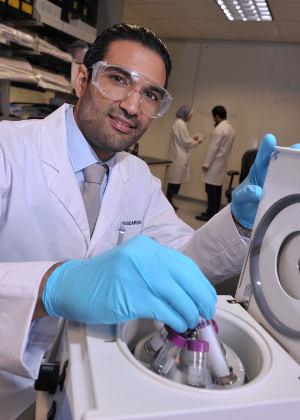Using AI to control energy for indoor agriculture
30 September 2024
Published online 20 July 2016
Researchers have assembled a reference genome to reflect the variants in Middle Eastern populations.

The availability of a Qatari reference genome should enable doctors to treat Arab patients using precision medicine, a process which involves incorporating information about a patient’s genome in the prediction, diagnosis, and treatment of diseases.
“Precise genome interpretation is key to the successful integration of genomics in healthcare decision-making,” says the study’s lead author, Khalid Fakhro of Weill Cornell Medicine in Qatar (WCM-Q) and the Sidra Medical and Research Center.
Genomic information about Arab populations has so far been sparse, limiting benefit from precision medicine and other fruits of modern genomics.
“When we started sequencing the first 100 Qatari genomes, we were surprised by the unusually high numbers of variants being called. Either the chemistry [of the sequencing reaction] was introducing systematic errors or there was something biologically interesting going on,” says Fakhro. The sequenced Qatari genomes differed from the standard reference genome at more than four million locations — roughly 25% more than expected if sequencing a Caucasian or East Asian genome.
Decoding the genomes of Qatari Bedouins revealed that indigenous Arabs have probably been present in the Arabian Peninsula since the out-of-Africa migration, representing one of the oldest populations outside Africa2. As a result of this ancient divergence, variants which are quite rare in other groups may be quite common in populations of the region, rendering the standard reference genome inadequate for studying them.
To overcome this, the team embarked on creating a reference genome which could be used as the standard for further work in Gulf Arab populations. They collected samples from more than 1,000 Qataris and analysed them using the genomics and advanced computing resources available at WCM-Q and WCM-NY. By only using data from individuals who were unrelated and whose four grandparents had all been born in Qatar, the team ensured that the reference genome would be representative of Qataris in particular and Arabs in general.
“For now, this reference genome will be a good approximation for most Middle Eastern Arabs, but it’s still not better than a truly local reference for each subpopulation,” says Fakhro, who would like to see Arab scientists work together to build a rich data set of Arab genomes.
The researchers found that roughly one out of every six differences between the Qatari genomes and the standard reference were in fact common among Qataris; these were therefore incorporated into the new reference genome. “Surprisingly, some of these were previously reported as Mendelian disease-causing variants,” says Fakhro, explaining that they may have been incorrectly labelled as rare because their prevalence in this population was not known.
"This study is the result of several years of hard work by colleagues in Qatar,” says Fowzan Alkuraya, a human geneticist at King Faisal Specialist Hospital and Research Center in Saudi Arabia. “I hope future studies will explore some of the features of the genome, but this is already a big step forward for genomics research in Qatar."
Alkuraya was not involved in this study. But Saudi Arabia is home to the Saudi Human Genome Project, which aims to discover disease-causing genetic variants in the Saudi population by sequencing 100,000 genomes.
Likewise, the Qatar Genome Programme was launched in 2014 with the goal of sequencing the entire Qatari population to deliver precision medicine. Both projects, along with studies of Arab samples elsewhere in the world, stand to benefit greatly from the new reference genome, which will reduce their computational burden and make false positives much less common.
“Qatar has made a serious commitment to be a leader in precision medicine, and we will continue to do our best to discover as much as possible for the Arab world from the Arab world,” says Fakhro.
doi:10.1038/nmiddleeast.2016.110
Stay connected: